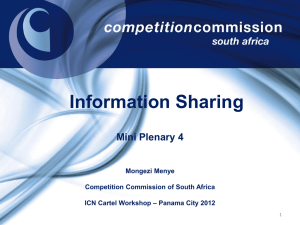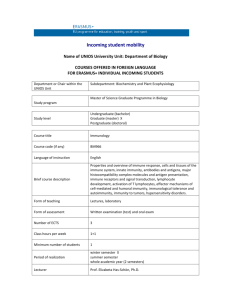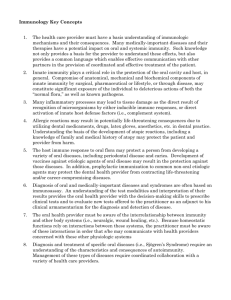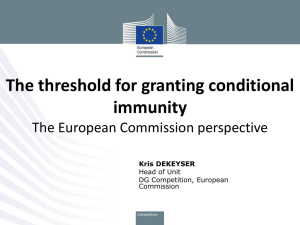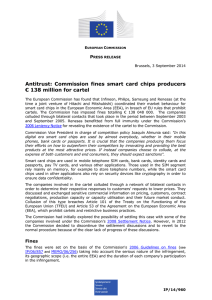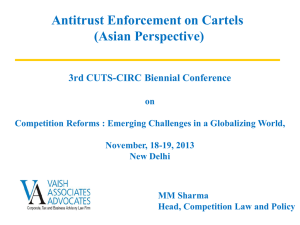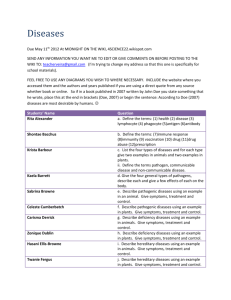DOC - Europa
advertisement
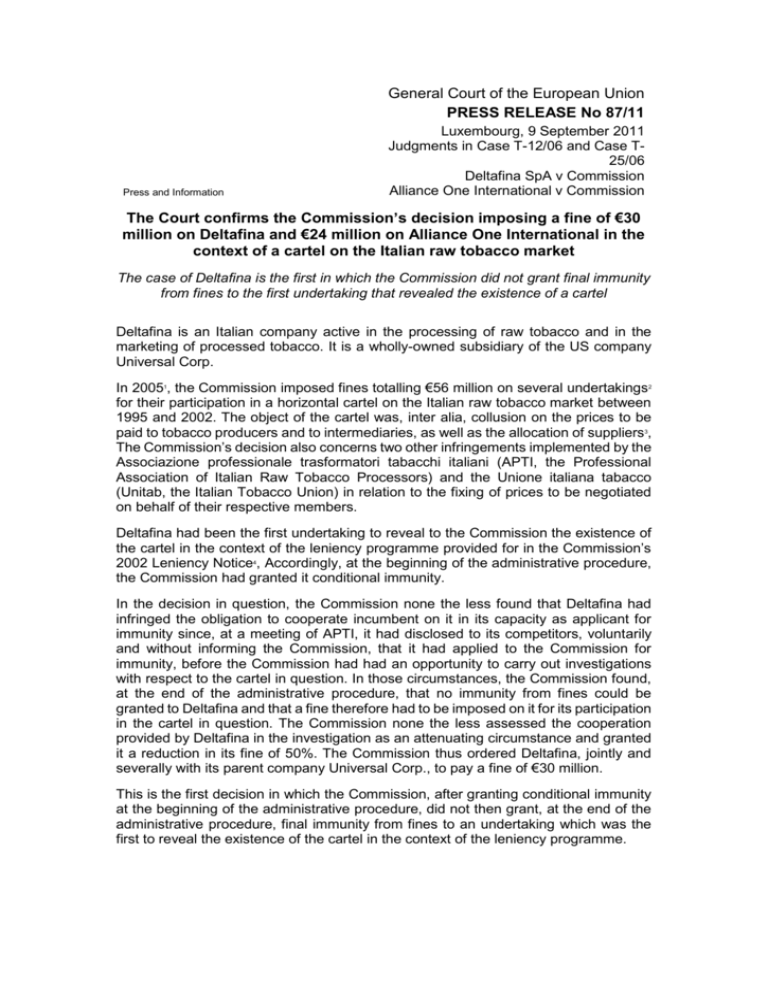
General Court of the European Union PRESS RELEASE No 87/11 Press and Information Luxembourg, 9 September 2011 Judgments in Case T-12/06 and Case T25/06 Deltafina SpA v Commission Alliance One International v Commission The Court confirms the Commission’s decision imposing a fine of €30 million on Deltafina and €24 million on Alliance One International in the context of a cartel on the Italian raw tobacco market The case of Deltafina is the first in which the Commission did not grant final immunity from fines to the first undertaking that revealed the existence of a cartel Deltafina is an Italian company active in the processing of raw tobacco and in the marketing of processed tobacco. It is a wholly-owned subsidiary of the US company Universal Corp. In 20051, the Commission imposed fines totalling €56 million on several undertakings2 for their participation in a horizontal cartel on the Italian raw tobacco market between 1995 and 2002. The object of the cartel was, inter alia, collusion on the prices to be paid to tobacco producers and to intermediaries, as well as the allocation of suppliers3, The Commission’s decision also concerns two other infringements implemented by the Associazione professionale trasformatori tabacchi italiani (APTI, the Professional Association of Italian Raw Tobacco Processors) and the Unione italiana tabacco (Unitab, the Italian Tobacco Union) in relation to the fixing of prices to be negotiated on behalf of their respective members. Deltafina had been the first undertaking to reveal to the Commission the existence of the cartel in the context of the leniency programme provided for in the Commission’s 2002 Leniency Notice4, Accordingly, at the beginning of the administrative procedure, the Commission had granted it conditional immunity. In the decision in question, the Commission none the less found that Deltafina had infringed the obligation to cooperate incumbent on it in its capacity as applicant for immunity since, at a meeting of APTI, it had disclosed to its competitors, voluntarily and without informing the Commission, that it had applied to the Commission for immunity, before the Commission had had an opportunity to carry out investigations with respect to the cartel in question. In those circumstances, the Commission found, at the end of the administrative procedure, that no immunity from fines could be granted to Deltafina and that a fine therefore had to be imposed on it for its participation in the cartel in question. The Commission none the less assessed the cooperation provided by Deltafina in the investigation as an attenuating circumstance and granted it a reduction in its fine of 50%. The Commission thus ordered Deltafina, jointly and severally with its parent company Universal Corp., to pay a fine of €30 million. This is the first decision in which the Commission, after granting conditional immunity at the beginning of the administrative procedure, did not then grant, at the end of the administrative procedure, final immunity from fines to an undertaking which was the first to reveal the existence of the cartel in the context of the leniency programme. Decision C (2005) 4012 final of 20 October 2005 (OJ 2006 L 353, p. 45). In addition to Deltafina, five other companies brought actions against the decision: Universal Corp. (parent company of Deltafina), Mindo, Transcatab, Alliance One International (legal successor of the former parent companies of Mindo and Transcatab) and the independent company Romana Tabacchi. The action brought by Universal Corp. was removed from the register by order of 1 September 2010 (Case T-34/06 ). The actions brought by Romana Tabacchi, Mindo and Transcatab are currently pending before the General Court (Cases T-11/06 , T-19/06 and T-39/06 ). 3 In October 2004, the Commission had also imposed fines in respect of a cartel on the Spanish raw tobacco market. By its judgment (Case T-29/05 Deltafina v Commission), the Court reduced the fine imposed on Deltafina from €11.88 million to €6.12 million (see CP n° 79/10 ). 4 Commission Notice on Immunity from fines and reduction of fines in cartel cases (OJ 2002 C 45, p. 3). 1 2 In its action brought before the Court, Deltafina challenged the lawfulness of the Commission’s decision. The Court first of all recalls that the leniency programme set up by the Commission aims to grant favourable treatment to undertakings which cooperate with it in investigations concerning secret cartels affecting the European Union. That programme is based on the consideration that the interests of consumers and citizens in ensuring that secret cartels are detected and punished outweigh the interest in fining those undertakings which cooperate with the Commission by enabling it to pursue and prohibit such cartels. The Court goes on to observe that, in the context of the leniency programme as provided for in the Leniency Notice, the first undertaking which reveals the existence of a cartel and which cooperates in the Commission’s investigation may, under certain conditions, be granted full immunity from the fines which would otherwise have been imposed on it for its participation in that cartel. However, in order to be granted such immunity, which constitutes an exception to the principle of personal liability for infringement of the competition rules of the European Union, that undertaking must, inter alia, cooperate with the Commission throughout the administrative procedure. According to the wording of that notice, that cooperation must be ‘[full, continuous and expeditious]’. In that regard, the Court recalls that, according to the case-law, it is clear from the very concept of cooperation, as described in the text of the Leniency Notice, that it is only where the conduct of the undertaking concerned demonstrates a genuine spirit of cooperation that a reduction in the fines, and a fortiori immunity from all fines, may be granted in the context of the leniency programme. The Court therefore observes that an undertaking seeking to benefit from full immunity from fines on the basis of its cooperation in the investigation may not omit to inform the Commission of relevant facts of which it was aware and which are capable of affecting, if only potentially, the conduct of the administrative procedure and the efficacy of the Commission’s investigation. In the present case, the Court notes that the conduct of Deltafina, which disclosed the fact that it had applied for immunity from fines without informing the Commission of that disclosure, did not demonstrate a genuine spirit of cooperation. Accordingly, the Court holds that, in its decision, the Commission did not err in not granting Deltafina final immunity on account of the fact that it had infringed its obligation to cooperate. Moreover, the Court observes that, prior to adoption of the final decision, the Commission was not able to assure Deltafina that it would be granted final immunity. Thus, although Deltafina was initially granted conditional immunity, because it did not subsequently fulfil the obligation to cooperate by which it was bound, it was no longer capable of qualifying for final immunity from fines for the purposes of the Leniency Notice. The Court takes the view that, in those circumstances, Deltafina was not entitled to derive a legitimate expectation that it would be granted final immunity on account of the fact that it had previously obtained conditional immunity. The Court examines lastly, inter alia, the proportionality of the fine. In that regard, it holds that the Commission was entitled to categorise the horizontal cartel in question as very serious and that the fine that it imposed on Deltafina was not disproportionate to the gravity of the infringement and to the other circumstances of the case. Moreover, in its judgment in Case T-25/06 Alliance One International, Inc. v Commission delivered in the context of the same cartel, the Court also confirms the Commission’s decision imposing a total fine of €24 million (€10 million jointly and severally with Mindo and €14 million jointly and severally with Transcatab) on Alliance One International. The General Court essentially relied on the case-law of the Court of Justice concerning the liability of parent companies holding the entire capital of the subsidiary which participated in the cartel5. Alliance One is a company established in the United States and is the result of a merger between Dimon Inc. and Standard Commercial Corp. (SCC), the former parent companies of Dimon Italia (subsequently renamed Mindo) and Transcatab, respectively. Case C 97/08 P Akzo Nobel and Others v Commission. NOTE: An appeal, limited to points of law only, may be brought before the Court of Justice against the decision of the General Court within two months of notification of the decision. NOTE: An action for annulment seeks the annulment of acts of the institutions of the European Union that are contrary to European Union law. The Member States, the European institutions and individuals may, under certain conditions, bring an action for annulment before the Court of Justice or the General Court. If the action is well founded, the act is annulled. The institution concerned must fill any legal vacuum created by the annulment of the act. Unofficial document for media use, not binding on the General Court. The full text of the judgments (T-12/06 & T-25/06 ) is published on the CURIA website on the day of delivery Press contact: Christopher Fretwell (+352) 4303 3355

